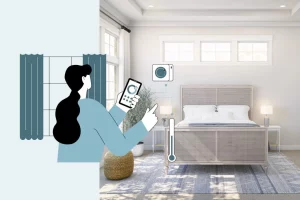In the competitive real estate market, smart home construction is key. By integrating smart technologies and cost-effective building methods, businesses can cut costs and boost returns. This approach offers many benefits for business owners. A closer look at smart home construction tips reveals its opportunities for optimizing operations and maximizing property value.
By using smart home construction, businesses can substantially reduce costs. This is achieved by integrating cutting-edge technologies and cost-effective building methods. Smart home construction offers a wealth of opportunities for business owners to optimize their operations. By taking a closer look at smart home construction techniques, businesses can maximize property value.
Key Takeaways
- Effective project management minimizes risks, delays, and cost overruns in smart home construction.
- Smart home design enables energy-efficient systems, improving indoor air quality and reducing energy consumption.
- Implementing prefabricated or modular construction methods reduces on-site construction time and labor costs.
- Smart home features increase a building’s value, making it more attractive to potential buyers or renters.
- Integrating smart security systems and surveillance cameras provides an added layer of safety and peace of mind for occupants.
Overcoming Construction Challenges
Effective project management is vital to overcoming construction challenges. A well-defined project plan and timeline can help to identify and address potential issues before they become major problems. Regular communication with stakeholders, including contractors and suppliers, is also essential to guarantee that everyone is aware of their roles and responsibilities. By adopting a systematic and methodical approach to smart home construction, business owners can minimize the risk of delays, cost overruns, and other challenges that can impact the success of a project. By following home construction tips, business owners can guarantee a smooth and successful construction process.

Benefits of Smart Home Design
Incorporating smart home design principles from the onset of a construction project can substantially enhance the functionality, efficiency, and overall value of a building. By integrating smart home construction tips into the design phase, business owners can reap numerous benefits. One of the primary advantages of smart home design is its ability to streamline operations and improve energy efficiency.
Some of the key benefits of smart home design include:
- Enhanced Energy Efficiency: Smart home design enables the integration of energy-efficient systems and appliances, reducing energy consumption and costs.
- Improved Indoor Air Quality: Smart home design incorporates ventilation systems and air quality monitoring, ensuring a healthier indoor environment.
- Increased Property Value: Smart home design features can remarkably increase a building’s value, making it more attractive to potential buyers or renters.
- Streamlined Operations: Smart home design enables the integration of automation systems, simplifying operations and reducing maintenance costs.
Cost-Effective Building Strategies
Implementing prefabricated or modular construction methods can also be a cost-effective strategy. These methods involve assembling building components off-site, reducing on-site construction time and labor costs. In addition, smart home construction tips can help minimize the risk of costly errors and changes during the construction process. By using building information modeling (BIM) and other digital tools, business owners can identify and address potential issues early on, preventing costly delays and rework. By incorporating these cost-effective building strategies, business owners can create smart homes that are not only sustainable but also economically viable. Effective home construction can help minimize costs and maximize returns on investment.
Boosting Business Efficiency
- Optimize project planning: Develop an exhaustive project plan that outlines timelines, milestones, and resource allocation. This will help identify potential bottlenecks and guarantee that all stakeholders are on the same page.
- Implement technology solutions: Leverage construction management software to streamline communication, track progress, and manage documentation.
- Standardize processes: Establish standardized processes for common tasks, such as site preparation and material procurement, to reduce errors and increase efficiency.
- Monitor performance metrics: Track key performance indicators (KPIs) such as project completion rates, budget variances, and customer satisfaction to identify areas for improvement.
Enhancing Property Value
A key aspect of enhancing property value is integrating smart home features that promote energy efficiency and sustainability. Installing smart thermostats, solar panels, and energy-efficient appliances can reduce energy consumption, resulting in lower utility bills and a reduced carbon footprint. Additionally, incorporating smart security systems and surveillance cameras can provide an added layer of safety and peace of mind for occupants.
Frequently Asked Questions
What Smart Home Features Are Energy-Efficient and Cost-Effective?
Energy-efficient smart home features include LED lighting, smart thermostats, and solar panels, offering cost-effective solutions by optimizing energy consumption and automating home systems to minimize waste and reduce operational expenses substantially.
Can Smart Home Systems Be Integrated With Existing Infrastructure?
Integrating smart home systems with existing infrastructure is feasible through various protocols such as Zigbee, Z-Wave, and Wi-Fi, allowing seamless connectivity and control of devices, and enhancing overall system efficiency and homeowner experience.
Are Smart Home Construction Materials Environmentally Friendly?
Environmentally friendly smart home construction materials are increasingly available, incorporating sustainable elements such as bamboo, low-VOC paints, and recycled materials, reducing waste and promoting eco-conscious building practices in the construction industry.
How Do Smart Home Designs Impact Property Insurance Costs?
Implementing smart home designs can substantially impact property insurance costs, as advanced security systems and automated alerts may reduce risk, leading to lower premiums and enhanced peace of mind for homeowners and business owners alike.
Can Smart Home Technology Be Used for Remote Property Management?
Yes, smart home technology can be utilized for remote property management through the integration of automation systems, sensors, and mobile applications, enabling business owners to monitor and control properties from a distance efficiently.
Conclusion
Implementing smart home construction tips can yield substantial benefits for business owners. By adopting cost-effective strategies and integrating smart features, construction challenges are overcome, and efficiency is boosted. Effective project management and standardized processes enhance property value, making properties more attractive to potential buyers or renters. Overall, smart home construction contributes to increased returns on investment, improved sustainability, and enhanced safety, thereby solidifying a competitive edge in the market.
Also Read: Professional Office Exterior Makeovers

